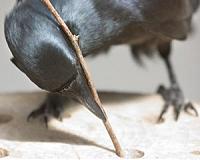| . |  |
. |
Paris (AFP) Sept 21, 2010 Already deeply troubled UN plans to brake the planet's dizzying loss of species have been further damaged by a row over setting up a scientific panel to assess Earth's biodiversity, sources here say. World governments are due to discuss the species crisis in New York on Wednesday, and the consensus is likely to be bleak. Under Target 7b of the Millennium Development Goals, UN members pledged to achieve by 2010 "a significant reduction" in the rate of wildlife loss. Yet every expert assessment points to accelerating declines in many species, especially mammals, birds and amphibians, their numbers ravaged by habitat loss, hunting or the suspected impact of climate change. Further darkening this picture is a row over setting up a top-level panel that, like the Nobel-winning Intergovernmental Panel on Climate Change (IPCC), would provide policymakers with the best scientific assessment on biodiversity. The mooted organisation, which goes by the unwieldy acronym of IPBES, for Intergovernmental Science Policy Platform on Biodiversity and Ecosystem Services, would list Earth's species at global and regional level, and spell out the value of them. The IPBES was endorsed at a meeting in Busan, South Korea in June that gathered members of the UN's Convention on Biological Diversity (CBD). In theory, it should be rubber-stamped in this session of the General Assembly. But French officials and sources in campaign groups say that the green light could well be delayed. Developing countries have said a formal decision on the panel is "premature" and want to postpone it to next year. The reason: they want to press rich countries on a proposal whereby a poor economy would receive payments for use of genetic "patrimony" -- unique species of plants or animals that, for instance, are found to have a commercial or medical use. This scheme would ramp up precious income for badly strapped countries and also be an encouragement to nurture forests, wetlands and other vital habitats, they argue. The objections were spelt out in a letter to the General Assembly on September 7 by the so-called Group of 77 and China, a bloc gathering the world's developing nations. The group "may consider" the decision on the IPBES after the upcoming conference of the CBD in Nagoya, Japan, which runs from October 18 to 29, and a meeting of the governing council of the UN Environment Programme (UNEP) in February 2011, the letter says. "It's a core question for the G77," said Claudio Chiarolla of the Institute for Sustainable Development and International Relations (IRRI), a Paris thinktank. "If there's no deal on protocol and finance, there'll be no deal on the rest, on all the things that are important for developed countries in long-term conservation," Chiarolla said. France's deputy ecology minister, Chantal Jouanno, who is taking part in the UN deliberations, said she was dismayed. "The IPBES is the basis for future commitments on biodiversity," she told AFP on Monday. "It absolutely has to be okayed this year if we want it to be operational in 2011." Jouanno took aim at "certain countries," which she did not identify, that "are trying to take the IPBES hostage." The G77 is itself divided, she said, adding that 28 African states, meeting in Libreville, Gabon, pledged last week to "support the establishment" of the panel. Objections may be eased in bilateral talks, she said. In July 2009 the International Union for Conservation of Nature (IUCN) warned that Earth was hurtling towards a mass extinction. Out of 44,838 species on the IUCN's famous "Red List", at least 16,928 are threatened with being wiped out, it said.
Share This Article With Planet Earth
Related Links Darwin Today At TerraDaily.com
 Crafty Crows Picking Out The Fat
Crafty Crows Picking Out The FatExeter, UK (SPX) Sep 21, 2010 Tool use is so rare in the animal kingdom that it was once believed to be a uniquely human trait. While it is now known that some non-human animal species can use tools for foraging, the rarity of this behaviour remains a puzzle. It is generally assumed that tool use played a key role in human evolution, so understanding this behaviour's ecological context, and its evolutionary roots, is of majo ... read more |
|
| The content herein, unless otherwise known to be public domain, are Copyright 1995-2010 - SpaceDaily. AFP and UPI Wire Stories are copyright Agence France-Presse and United Press International. ESA Portal Reports are copyright European Space Agency. All NASA sourced material is public domain. Additional copyrights may apply in whole or part to other bona fide parties. Advertising does not imply endorsement,agreement or approval of any opinions, statements or information provided by SpaceDaily on any Web page published or hosted by SpaceDaily. Privacy Statement |